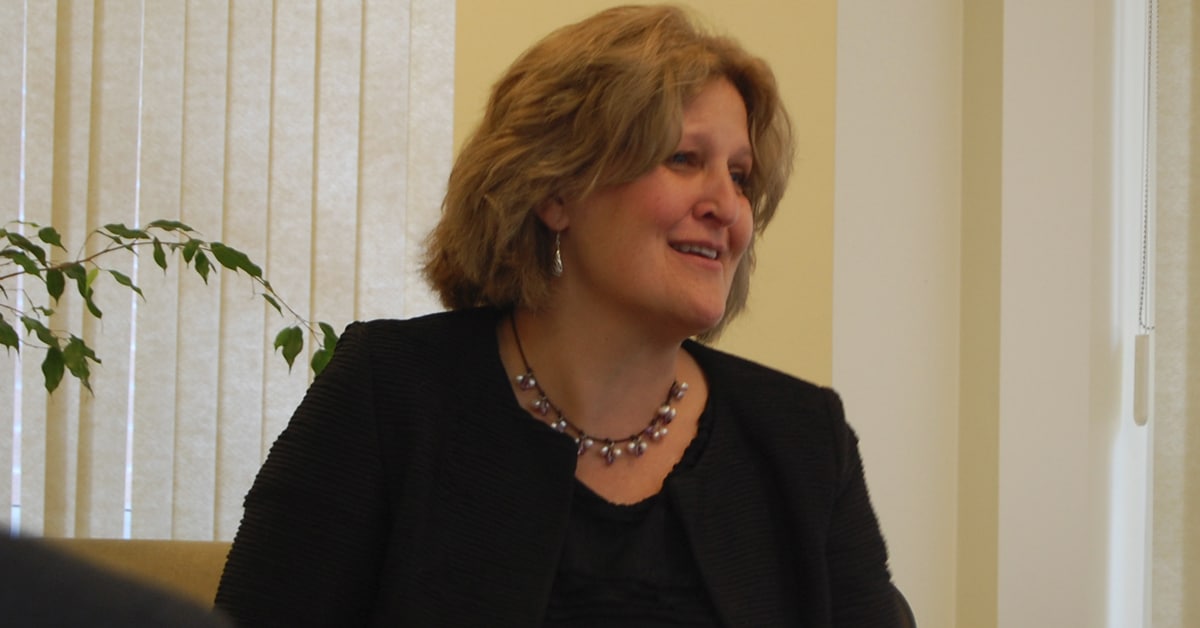The co-director of the Anglican Alliance stopped by Church House on Friday, Feb. 20 for a visit that highlighted ongoing work of the Alliance as well as how the Anglican Church of Canada might continue to build and strengthen effective partnerships.
The Rev. Rachel Carnegie, named as joint executive director in 2013, spoke with Church House staff members as part of a “lunch and learn” event discussing the Alliance, which was established in 2011 to bring members of the Anglican Communion together in the global struggle against poverty, inequality, conflict and injustice.
“Because the Anglican Alliance is working across the Communion and it’s not just focusing on the so-called developing countries, we’re actually now very intentionally trying to understand the life and ministry of the churches in all parts of the Communion,” Carnegie said.
Her visit to Toronto arose out of a desire to gain more insights into the work of the Anglican Church of Canada and to support its international mandate for the Primate’s World Relief and Development Fund (PWRDF).
“Obviously PWRDF has been part of the Alliance story from the beginning, and was absolutely key to helping conceptualize what the Alliance should be and how it should function in the Communion,” Carnegie said.
The Anglican Alliance, she added, was interested “not just in the life of the agencies, but also in the life of the church…to understand more and connect more with the Anglican Church of Canada and the work that it’s doing on the ground on issues of social exclusion and poverty and justice.”
Offering a brief history of the Alliance, Carnegie noted how it grew out of recognition of the need for a more co-ordinated approach by churches, missions and development agencies.
She compared the Alliance to the indigenous Sacred Circle, saying it serves more as a gathering for conversation than a structured agency. Through a series of consultations, organizations across the Anglican Communion—including the PWRDF—identified three pillars of the Alliance: development, relief and advocacy.
Carnegie provided examples of the Alliance’s work in each area, such as bringing together Anglicans from Australia and the Pacific Islands to press government leaders to address climate change during a G8 summit.
Identifying global themes for its efforts stemming from regional priorities, Carnegie pointed to the empowerment of youth and women, such as through campaigns against gender-based violence; combatting human trafficking; helping refugees and striving for peace and reconciliation; and tackling issues related to climate change and food security—with the latter currently a major focus for the PWRDF.
Subsequent discussion focused on work in Canada that might be bolstered through the Alliance, such as addressing concerns of indigenous peoples related to tar sands development.
Reflecting upon her visit, Carnegie noted, “I’m struck yet again by…the richness in the life of the church here, the integrity that’s being sought in the life of the church here as you look at historical issues and especially around the indigenous peoples.
“I think there’s a real sort of humility in the way people are trying to understand and engage with that, which I find incredibly powerful and moving…To meet many more of the partners and the staff of PWRDF…I think that they’re really trying to re-configure traditional development partnerships into something that is much more interdependent and equal.”
Learn more about the Anglican Alliance.
Interested in keeping up-to-date on news, opinion, events and resources from the Anglican Church of Canada? Sign up for our email alerts .

